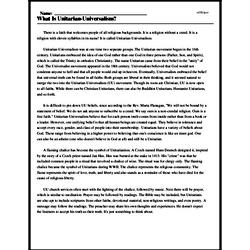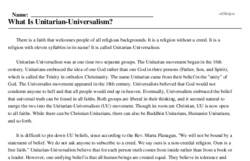What Is Unitarian-Universalism?
There is a faith that welcomes people of all religious backgrounds. It is a religion without a creed. It is a religion with eleven syllables in its name! It is called Unitarian-Universalism.
Unitarian-Universalism was at one time two separate groups. The Unitarian movement began in the 16th century. Unitarians embraced the idea of one God rather than one God in three persons (Father, Son, and Spirit), which is called the Trinity in orthodox Christianity. The name Unitarian came from their belief in the "unity" of God. The Universalist movement appeared in the 18th century. Universalists believed that God would not condemn anyone to hell and that all people would end up in heaven. Eventually, Universalists embraced the belief that universal truth can be found in all faiths. Both groups are liberal in their thinking, and it seemed natural to merge the two into the Unitarian-Universalism (UU) movement. Though its roots are Christian, UU is now open to all faiths. While there can be Christian Unitarians, there can also be Buddhist Unitarians, Humanist Unitarians, and so forth.
It is difficult to pin down UU beliefs, since according to the Rev. Marta Flanagan, "We will not be bound by a statement of belief. We do not ask anyone to subscribe to a creed. We say ours is a non-creedal religion. Ours is a free faith." Unitarian-Universalists believe that for each person truth comes from inside rather than from a book or a leader. However, one unifying belief is that all human beings are created equal. They believe in tolerance and accept every race, gender, and class of people into their membership. Unitarians have a variety of beliefs about God. These range from believing in a higher power to believing that one's conscience is like an inner god. One can also be an atheist (one who doesn't believe in God at all) and still be a Unitarian.




